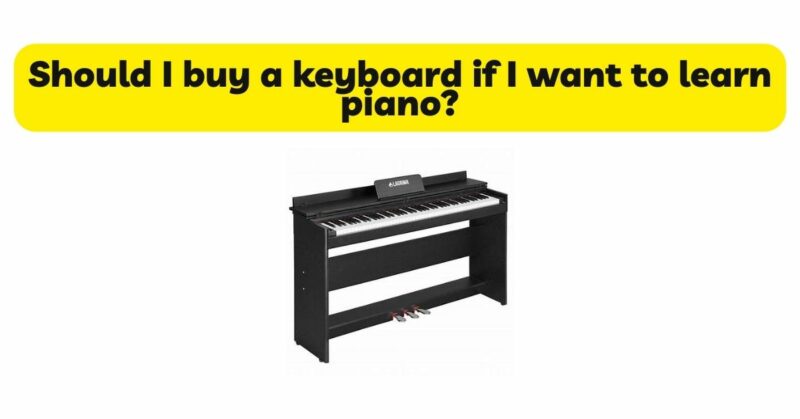When aspiring musicians set out to learn piano, one common dilemma they face is whether to invest in a keyboard. In this article, we will explore the considerations and benefits of buying a keyboard as a tool for learning piano. By examining the advantages, practicalities, and potential limitations, we aim to provide insights that will help you make an informed decision about purchasing a keyboard to support your piano learning journey.
- Accessibility and Affordability: One of the primary advantages of buying a keyboard when learning piano is its accessibility and affordability. Keyboards are generally more accessible in terms of cost and physical space requirements compared to acoustic pianos. Keyboards are typically more affordable and come in a variety of price ranges, making them a practical option for beginners who may have budget constraints. Additionally, keyboards are compact, lightweight, and portable, allowing for easy transportation and the ability to practice in different locations. This accessibility and affordability make keyboards an attractive choice for those starting their piano learning journey.
- Learning Tools and Features: Keyboards often come equipped with a wide array of learning tools and features that can enhance your piano learning experience. Many keyboards offer built-in metronomes, digital displays, recording capabilities, and a range of pre-set sounds and accompaniments. These features can be valuable tools for practicing rhythm, timing, and musical expression. Some keyboards even include learning modes, step-by-step tutorials, and interactive lessons, providing guidance and feedback to beginners as they progress. These learning tools and features can facilitate effective practice sessions and contribute to skill development.
- Touch Sensitivity and Key Action: One aspect to consider when buying a keyboard for learning piano is its touch sensitivity and key action. Acoustic pianos are known for their touch-sensitive keys that respond to the player’s touch, allowing for expressive playing and nuanced dynamics. While keyboards may not fully replicate the touch sensitivity of acoustic pianos, many models now offer weighted keys or graded hammer action to simulate the feel of an acoustic piano. These features provide a more authentic playing experience and facilitate the development of proper finger technique and control. When selecting a keyboard, consider one with touch-sensitive keys or weighted action for a more piano-like playing experience.
- Sound Quality and Reproduction: While keyboards may not produce the same rich and resonant sound as acoustic pianos, they have made significant advancements in sound sampling technology. High-quality keyboards strive to replicate the sound of pianos as faithfully as possible, providing a satisfying playing experience. They often offer a range of piano sounds that can closely approximate the tonal characteristics of an acoustic piano. It’s important to note that the sound quality may vary depending on the specific keyboard model and its built-in sound engine. When purchasing a keyboard, listen to its piano sounds and consider the level of sound quality you desire for your piano learning journey.
- Practicing in a Variety of Settings: One advantage of owning a keyboard for piano learning is the ability to practice in various settings. Unlike acoustic pianos, which require a dedicated space and professional assistance for relocation, keyboards are portable and can be easily moved. This flexibility allows you to practice in different rooms or locations, making it easier to fit piano practice into your daily routine. Additionally, keyboards often have headphone outputs, allowing for private practice without disturbing others. This versatility in practicing settings can contribute to regular and consistent practice, essential for progress in piano learning.
- Transitioning to Acoustic Pianos: A concern often raised by aspiring pianists learning on a keyboard is the ability to transition effectively to playing on an acoustic piano. While there are differences between keyboards and acoustic pianos in terms of touch sensitivity and sound production, the core skills developed on a keyboard can be transferred to an acoustic piano with practice and guidance. As you progress in your piano learning journey, it can be beneficial to occasionally practice on an acoustic piano to familiarize yourself with its touch and sound characteristics. Seeking guidance from a piano teacher who can provide insights and instruction specific to acoustic pianos can also aid in a smooth transition.
- Personal Goals and Long-Term Aspirations: When deciding whether to buy a keyboard for learning piano, it’s crucial to consider your personal goals and long-term aspirations. If you have a strong desire to pursue classical piano performance, study at a higher level, or perform on an acoustic piano in professional settings, investing in an acoustic piano may be more suitable. The touch sensitivity, sound quality, and authenticity of an acoustic piano can be essential for advancing in certain musical genres. However, if your goals involve exploring various musical styles, composing, arranging, or performing in different settings, a keyboard can provide the versatility and convenience to support those endeavors. Reflect on your musical aspirations, preferences, and commitment level to guide your decision.
Conclusion: Deciding whether to buy a keyboard for learning piano requires careful consideration of factors such as accessibility, affordability, learning tools, touch sensitivity, sound quality, practicing flexibility, and personal goals. Keyboards offer accessibility, affordability, and a range of learning features that can support beginners in their piano learning journey. While they may not fully replicate the touch and sound of acoustic pianos, high-quality keyboards strive to provide a satisfying playing experience. Ultimately, the decision should align with your specific circumstances, preferences, and long-term aspirations. Remember that consistent practice, dedication, and a love for music are paramount to your growth as a pianist, regardless of the instrument you choose.


